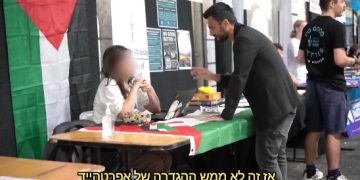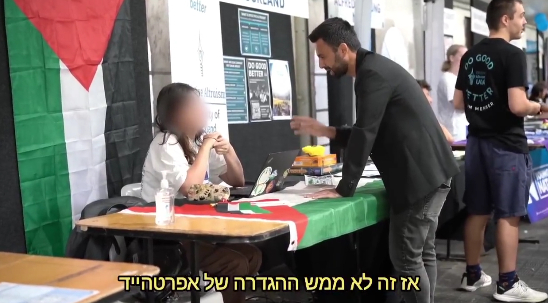An Arab-Israeli activist was captured on video dismantling a students’ academic knowledge of Israel being an “apartheid state.”
In a video posted to X, formerly known as Twitter, Yoseph Haddad spoke speaking with an unknown female student from the University of Auckland in New Zealand, and asked for more information about apartheid state from the university’s Palestinian club.
Haddad asked the student what an apartheid state is and whether Israel is or is not an apartheid state. The student informed Haddad that she’s “not the best to ask” because she isn’t “super knowledgable.”
Haddad reacted to the student’s response by admitting that he is confused. “Sorry, I’m really confused because this is really important. This apartheid is not OK.”
“I tried to go online and search about it,” Haddad told the student. “And, I saw a lot of talks like, ‘Oh, there isn’t apartheid,’ ‘there is apartheid’ and I said I’m going to come here and just gonna hear it from you guys, but, can, can I be honest? I’m really disappointed because I thought if you represent the Palestinian Club, you would know about it.”
If you want to understand how little the Palestinian ‘activists’ and sympathizers in the world know about the reality in Israel – spend 5 minutes watching what happened when I arrived at the University of Auckland to "register" for their Palestinian club… pic.twitter.com/WYpm9Lg8Dh
— יוסף חדאד – Yoseph Haddad (@YosephHaddad) October 21, 2023
Upon being asked by Haddad if there is an apartheid, the girl told him, based on her “personal opinion, yes” to which he appeared confused and informed her that “personal opinion does not matter” and facts matter.
Haddad continued to ask the student for the definition of an apartheid to which she appeared to respond by laughing as she told him, “I don’t have the definition with me. Uhm..I think from what I believe I mean you’ve got checkpoints, so…”
As the student explained what she thinks an apartheid is, Haddad pointed out that there are checkpoints “in between countries,” adding that if someone from a neighboring country wants to travel to Brazil, they encounter a checkpoint. “So, this is not exactly the definition of apartheid.”
Haddad continued to ask for clarification about whether Arabs who live in Israel live under apartheid. The girl admitted she doesn’t know because she’s never been to Israel. When asked about the Palestinians, the girl again informed him that she’s never been to Palestine.
“So, they live under apartheid or they don’t live under apartheid?” Haddad asked.
Once again, the girl pointed out there are checkpoints, along with “separate….like license plates.”
Appearing confused, Haddad asked, “Their license of the car?” to which the girl said, “Yeah, it’s like a different color.”
“Why it should be the same? If like, a person from New Zealand has a license plate of New Zealand, and a person from Australia has a license plate from Australia, how is that…so New Zealand is an apartheid to Australia or Australia is an apartheid to New Zealand?”
As the girl began to explain “that’s different” Haddad informed her he is an “Arab who lives in Israel.”
“I don’t know what people are telling you or not telling you. I don’t know if any of those people who are in the even speaks Arabic like me as an Arab,” Haddad said. “There are problems. I will never say that there isn’t a problem. But, I have to be honest with you, this is a brainwash.”
Haddad pointed out that he can “vote” and “get elected.”
“I can become the president of Israel if I want right now,” Haddad explained. “To nominate myself, whether I win or not, that’s different. I don’t have a different bus system. I don’t have a different judge system. In fact, an Arab judge, an Arab judge in Israel, a supreme court judge sent to prison a Jewish prime minister and Jewish president. I don’t want you to believe me, I want you to check the name, Salim Joubran.
“In an apartheid that cannot happen. I have freedom of movement, I came to New Zealand with my Israeli passport as an Arab. No one can stop me. And by the way, it doesn’t mean that racism does not exist or discrimination.”
Haddad ended by asking about Hamas, a Palestinian terrorist organization that took control of Gaza in 2007 after defeating its rival political party, Fatah, in the election the previous year. In response to Hamas’ takeover of Gaza, the Israeli government placed a blockade on the Gaza Strip, restricting what goods could go in and out through Israeli-controlled border crossings.
The student was informed that “Hamas controls Gaza, Israel does not control Gaza. So, Israel does not have even one inch. Hamas has a border with Egypt and Egypt closed that border as well. So, why an Arab state closed the border with an Arab Gaza? Because of terrorism.”
“I don’t live under apartheid regime. The Palestinians, they have problems, which we need to resolve,” Haddad explained. “But, the obstacle is not actually Israel, the obstacle right now is terrorist organization from Gaza and the corrupted Palestinian Authority.”
On Oct. 7, Hamas launched a surprise attack on Israel, firing thousands of rockets and killing more than 250 people who had been attending a music festival near the Gaza border. In response to the attack, Israel declared war on Hamas.
In the aftermath of the attack, student organizations from Harvard University, the University of California Berkeley, and George Washington University issued letters calling out Israel’s “apartheid regime.”
Since Hamas’ attack, pro-Palestinian supporters during various rallies have been spotted holding signs calling for an end to Israel’s apartheid regime.


























 Continue with Google
Continue with Google